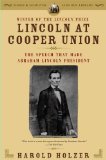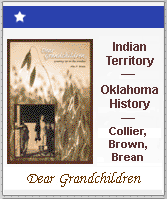
 |
 |
|
| |
||


Speech at Cooper InstituteAlso known as Cooper Union Address
Would Lincoln appear as a lecturer in the Plymouth Lecture Course? That was the question that led to the single biggest event contributing to Lincoln's nomination to the presidency in 1860. It was late 1859, when James A. Briggs wrote to Abraham Lincoln about appearing as one of the speakers in the Plymouth Lecture Course held at Ward Beecher's church in Brooklyn, New York. Lincoln would be paid $200 to cover travel expenses and a small honorarium--a sum which would later lead to allegations of wrong-doing. The lecture topic could be of Lincoln's choosing, and because of timing considerations, Lincoln informed Briggs that he would give a political speech. Consequently, the organizers moved the venue to the Cooper Institute--though Lincoln did not know of the arrangement before he got there. Their goal was to draw a large crowd, including prominent citizens who might not ordinarily attend a political rally. "These lectures have been contrived to call out our better but busier citizens, who never attend political meetings. A large part of the audience would also consiste of ladies" [Lincoln's Speeches Reconsidered]. Lincoln's law partner, William Herndon, later recalled that when Lincoln learned that the speech would not be at Beecher's church--where the audience would have been particularly sympathetic to the Republican cause--Lincoln modified the speech. He needed to make the Republican case without relying on partisan support. Just how the speech was changed is not known.
The speech at Cooper Institute, also called the Cooper Union Address, took place in New York City, on February 27, 1860, three months before the Republican Party's nominating convention. Attendees were charged the usual fee of 25 cents to attend the Plymouth Lecture Course event. Of course, the Lincoln-Douglas debates in 1858, had brought national prominence to Lincoln. Lincoln now had the reputation as "the conquerer of Douglas." At Columbus, Ohio, in 1859, Douglas had said:
It is from this point that Lincoln started, meticulously presenting a case against the extension of slavery.
MR. PRESIDENT AND FELLOW-CITIZENS OF NEW-YORK: The facts with which I shall deal this evening are mainly old and familiar; nor is there anything new in the general use I shall make of them. If there shall be any novelty, it will be in the mode of presenting the facts, and the inferences and observations following that presentation. In his speech last autumn, at Columbus, Ohio, as reported in "The New-York Times," Senator Douglas said:
I fully indorse this, and I adopt it as a text for this discourse. I so adopt it because it furnishes a precise and an agreed starting point for a discussion between Republicans and that wing of the Democracy headed by Senator Douglas. It simply leaves the inquiry: "What was the understanding those fathers had of the question mentioned?" What is the frame of Government under which we live? The answer must be: "The Constitution of the United States." That Constitution consists of the original, framed in 1787, (and under which the present government first went into operation,) and twelve subsequently framed amendments, the first ten of which were framed in 1789. Who were our fathers that framed the Constitution? I suppose the "thirty-nine" who signed the original instrument may be fairly called our fathers who framed that part of the present Government. It is almost exactly true to say they framed it, and it is altogether true to say they fairly represented the opinion and sentiment of the whole nation at that time. Their names, being familiar to nearly all, and accessible to quite all, need not now be repeated. I take these "thirty-nine" for the present, as being "our fathers who framed the Government under which we live." What is the question which, according to the text, those fathers understood "just as well, and even better than we do now?" It is this: Does the proper division of local from federal authority, or anything in the Constitution, forbid our Federal Government to control as to slavery in our Federal Territories? Upon this, Senator Douglas holds the affirmative, and Republicans the negative. This affirmation and denial form an issue; and this issue--this question--is precisely what the text declares our fathers understood "better than we." Let us now inquire whether the "thirty-nine," or any of them, ever acted upon this question; and if they did, how they acted upon it--how they expressed that better understanding? In 1784, three years before the Constitution--the United States then owning the Northwestern Territory, and no other, the Congress of the Confederation had before them the question of prohibiting slavery in that Territory; and four of the "thirty-nine," who afterward framed the Constitution, were in that Congress, and voted on that question. Of these, Roger Sherman, Thomas Mifflin, and Hugh Williamson voted for the prohibition, thus showing that, in their understanding, no line dividing local from federal authority, nor anything else, properly forbade the Federal Government to control as to slavery in federal territory. The other of the four--James McHenry voted against the prohibition, showing that, for some cause, he thought it improper to vote for it. In 1787, still before the Constitution, but while the Convention was in session framing it, and while the Northwestern Territory still was the only territory owned by the United States, the same question of prohibiting slavery in the territory again came before the Congress of the Confederation; and two more of the "thirty-nine" who afterward signed the Constitution, were in that Congress, and voted on the question. They were William Blount and William Few; and they both voted for the prohibition--thus showing that, in their understanding, no line dividing local from federal authority, nor anything else, properly forbade the Federal Government to control as to slavery in federal territory. This time the prohibition became a law, being part of what is now well known as the Ordinance of '87. The question of federal control of slavery in the territories, seems not to have been directly before the Convention which framed the original Constitution; and hence it is not recorded that the "thirty-nine," or any of them, while engaged on that instrument, expressed any opinion of that precise question.
This shows that, in their understanding, no line dividing local from federal authority, nor anything in the Constitution, properly forbade Congress to prohibit slavery in the federal territory; else both their fidelity to correct principle, and their oath to support the Constitution, would have constrained them to oppose the prohibition. Again, George Washington, another of the "thirty-nine," was then President of the United States, and, as such, approved and signed the bill; thus completing its validity as a law, and thus showing that, in his understanding, no line dividing local from federal authority, nor anything in the Constitution, forbade the Federal Government, to control as to slavery in federal territory. No great while after the adoption of the original Constitution, North Carolina ceded to the Federal Government the country now constituting the State of Tennessee; and a few years later Georgia ceded that which now constitutes the States of Mississippi and Alabama. In both deeds of cession it was made a condition by the ceding States that the Federal Government should not prohibit slavery in the ceded country. Besides this, slavery was then actually in the ceded country. Under these circumstances, Congress, on taking charge of these countries, did not absolutely prohibit slavery within them. But they did interfere with it--take control of it--even there, to a certain extent. In 1798, Congress organized the Territory of Mississippi. In the act of organization, they prohibited the bringing of slaves into the Territory, from any place without the United States, by fine, and giving freedom to slaves so brought. This act passed both branches of Congress without yeas and nays. In that Congress were three of the "thirty-nine" who framed the original Constitution. They were John Langdon, George Read and Abraham Baldwin. They all, probably, voted for it. Certainly they would have placed their opposition to it upon record, if, in their understanding, any line dividing local from federal authority, or anything in the Constitution, properly forbade the Federal Government to control as to slavery in federal territory. In 1803, the Federal Government purchased the Louisiana country. Our former territorial acquisitions came from certain of our own States; but this Louisiana country was acquired from a foreign nation. In 1804, Congress gave a territorial organization to that part of it which now constitutes the State of Louisiana. New Orleans, lying within that part, was an old and comparatively large city. There were other considerable towns and settlements, and slavery was extensively and thoroughly intermingled with the people. Congress did not, in the Territorial Act, prohibit slavery; but they did interfere with it--take control of it--in a more marked and extensive way than they did in the case of Mississippi. The substance of the provision therein made, in relation to slaves, was: First. That no slave should be imported into the territory from foreign parts. Second. That no slave should be carried into it who had been imported into the United States since the first day of May, 1798. Third. That no slave should be carried into it, except by the owner, and for his own use as a settler; the penalty in all the cases being a fine upon the violator of the law, and freedom to the slave. This act also was passed without yeas and nays. In the Congress which passed it, there were two of the "thirty-nine." They were Abraham Baldwin and Jonathan Dayton. As stated in the case of Mississippi, it is probable they both voted for it. They would not have allowed it to pass without recording their opposition to it, if, in their understanding, it violated either the line properly dividing local from federal authority, or any provision of the Constitution. In 1819-20, came and passed the Missouri question. Many votes were taken, by yeas and nays, in both branches of Congress, upon the various phases of the general question. Two of the "thirty-nine"--Rufus King and Charles Pinckney--were members of that Congress. Mr. King steadily voted for slavery prohibition and against all compromises, while Mr. Pinckney as steadily voted against slavery prohibition and against all compromises. By this, Mr. King showed that, in his understanding, no line dividing local from federal authority, nor anything in the Constitution, was violated by Congress prohibiting slavery in federal territory; while Mr. Pinckney, by his votes, showed that, in his understanding, there was some sufficient reason for opposing such prohibition in that case. The cases I have mentioned are the only acts of the "thirty-nine," or of any of them, upon the direct issue, which I have been able to discover. To enumerate the persons who thus acted, as being four in 1784, two in 1787, seventeen in 1789, three in 1798, two in 1804, and two in 1819-20--there would be thirty of them. But this would be counting John Langdon, Roger Sherman, William Few, Rufus King, and George Read, each twice, and Abraham Baldwin, three times. The true number of those of the "thirty-nine" whom I have shown to have acted upon the question, which, by the text, they understood better than we, is twenty-three, leaving sixteen not shown to have acted upon it in any way. Here, then, we have twenty-three out of our thirty-nine fathers "who framed the Government under which we live," who have, upon their official responsibility and their corporal oaths, acted upon the very question which the text affirms they "understood just as well, and even better than we do now;" and twenty-one of them a clear majority of the whole "thirty-nine"--so acting upon it as to make them guilty of gross political impropriety and willful perjury, if, in their understanding, any proper division between local and federal authority, or anything in the Constitution they had made themselves, and sworn to support, forbade the Federal Government to control as to slavery in the federal territories. Thus the twenty-one acted; and, as actions speak louder than words, so actions, under such responsibility, speak still louder. see also: Lincoln's note to Mary Lincoln
|
 |
Copyright © 2005-2016 Alta Omnimedia. All Rights Reserved.




